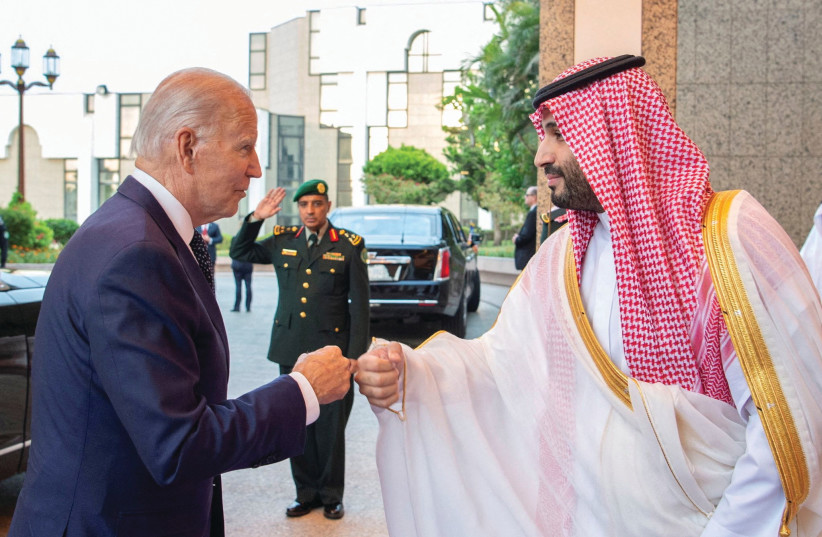In February 2002, veteran New York Times columnist Thomas Friedman crossed the line from respected journalist to diplomatic adventurist, advocate, lobbyist and provocateur.
Friedman’s victim was the State of Israel, which came under enormous international pressure to embark on a dangerous withdrawal from the entire biblical heartland of the Jewish people in Judea and Samaria.
The so-called Saudi Initiative, which was really Friedman’s own delusion, called for a total withdrawal by Israel to the lines of June 4, 1967, and the establishment of a Palestinian state with Jerusalem as its capital. In return for relinquishing all its diplomatic, security, historic and religious assets won in the 1967 war of defense, Israel would receive an obviously empty promise that all 22 members of the Arab League would offer full diplomatic relations, normalized trade and security guarantees.
The Arab League back then still featured Saddam Hussein’s Iraq, Muammar Gaddafi’s Libya and Bashar Assad’s Syria, who in Friedman’s eyes would turn their attention from the mass murder of their own people to suddenly guarantee the future security of the Jewish state.
The world – and Friedman’s own employer – should have already shunned him then as an insane purveyor of nonsense and dismissed his pathetically far-fetched ideas. But they were instead taken very, very seriously.

Ariel Sharon’s Gaza Strip disengagement – and further withdrawals planned by his successor Ehud Olmert – were a direct result of Friedman’s plans. The Gaza Strip withdrawal was intended to resist international pressure on Israel to relinquish land in the center of the country.
The result of this pressure on Israel, initiated by Friedman, ended up being the tens of thousands of rockets fired upon Israelis from the Strip, three avoidable wars and the overthrowing of the Palestinian Authority in Gaza by the Hamas terrorist organization. That should have been enough to silence Friedman into shame.
THE FINAL nail in the proverbial coffin of Friedman’s diplomacy should have been the success of the Abraham Accords in achieving peace for Israel with four Arab countries. The accords proved that the Jewish state need not give up an inch of land, allow another capital in Jerusalem or bestow its security to a maniacal Mideast dictator. All it needed was to be strong, technologically advanced and economically successful to be a desired peace partner.
Tom Friedman's comeback
But the defeat of Donald Trump and the rise of Joe Biden unfortunately gave new life to the 68-year-old columnist, to embark on another Saudi adventure to the detriment of Israel. If Friedman had true ties in the current Saudi leadership, he would know that they could not care less about the Palestinians.
Over the weekend, while Biden traveled from Jerusalem to Jeddah, the Times published Friedman’s column entitled “Only Saudi Arabia and Israeli Arabs Can Save Israel as a Jewish Democracy,” in print and online.
“I suspect the Saudis will want such a game-changing moment to unfold in two stages,” he wrote. Stage 1 in Friedman’s new scheme is that, in return for the Saudis opening a commercial trade office in Tel Aviv, they should “demand Israel halt all settlement-building to the east of the Israeli security barrier in the West Bank and agree that the Saudi-Arab peace plan for a two-state solution be a basis of negotiations with the Palestinians.”
Why Israel would adopt Friedman’s failed plan from 20 years ago and harm its people in return for an unnecessary brick and mortar Saudi presence not in Israel’s capital is explained as a “big psychological move.” But the only psychological move is Friedman’s own obsession with Israel displacing 700,000 Jews from their homes, and treating that is clearly urgent.
STAGE 2 would be “the end to the Israeli occupation and a peace deal with the Palestinians,” in which Israel would again bestow its security to the Arab League in return for the dubious prize of a Saudi embassy in Israel (and another one for the Palestinian state, of course).
“I can 100 percent guarantee that if the Saudis made [Friedman’s proposals] public, they would play a central role in Israel’s Nov. 1 election and help spark the kind of debates and creativity needed to preserve Israel as a democratic state,” he wrote.
That line is the only one in Friedman’s column that bears some truth. All evidence proves that if international pressure on Israel resumes, it would indeed become a key campaign issue and opposition leader Benjamin Netanyahu would win the election by a landslide.
To form a government, Netanyahu would not need the support of Israeli Arab MKs, whom Friedman also advises nefariously in his column. After Mansour Abbas’s Ra’am Party joined the outgoing government on the basis of it ignoring the Palestinian issue and focusing on improving the lives of Israeli Arab citizens, Friedman urged Ra’am to instead “declare that it would only enter a Jewish-led government that agreed to negotiate with the Palestinians on the basis of the Saudi overtures.”
Yes, after four elections in three years and with another on the way, Friedman is really calling for encouraging further political paralysis in Israel, just in order to advance his own rejected Mideast peace plan.
After the Israeli government made such fateful mistakes in response to Friedman’s pressure two decades ago, it is imperative for the Jewish state to maintain its security – and hopes for real peace with its neighbors – by emphatically saying no to Friedman now.
The writer is co-president of Religious Zionists of America, chairman of the Center for Righteousness and Integrity, and a committee member of the Jewish Agency. He was appointed by former US president Donald Trump as a member of the United States Holocaust Memorial Council. The views expressed are his own. Martinoliner@gmail.com
